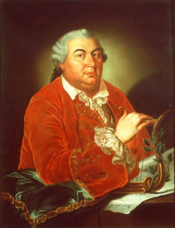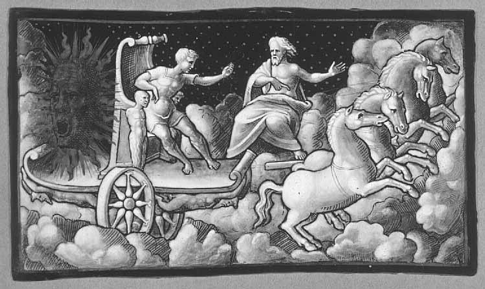
03 Mar 2008
JOMMELLI: Fetonte
Fetonte: Dramma per musica in three acts.
Mozart and Salieri, an opera in one act consisting of two scenes.
Nicolai Rimsky-Korsakov (1844-1908), composer. Libretto derived from Alexander Puskhin's play of the same name.
First performance: 7 December 1898 in Moscow.
Ariadne auf Naxos, Oper with a prologue and one act. Music composed by Richard Strauss. Libretto by Hugo von Hofmannsthal.
La Vestale, a tragédie lyrique in three acts.
Boris Godunov, an opera in four acts with prologue
Modest Mussorgsky, composer. Libretto by the composer, based on Alexander Pushkin's drama Boris Godunov and Nikolai Karamazin's History of the Russian Empire
First performance: 8 February 1874 at the Mariinsky Theatre, St. Petersburg
Il Trovatore, dramma in four parts.
Only a few months following the premiere of Der Rosenkavalier, Hugo von Hofmannsthal proposed a new opera to Richard Strauss based on Molière’s comedy-ballet, Le Bourgeois gentilhomme (in German, Der Bürger als Edelmann).
Die Entführung aus dem Serail, Singspiel in 3 Acts.
Music composed by Wolfgang Amadeus Mozart (1756–1791). Libretto by Johann Gottlieb Stephanie the Younger, based on an earlier libretto by
Christoph Friedrich Bretzner.
Die Entführung aus dem Serail, Singspiel in 3 Acts.
Music composed by Wolfgang Amadeus Mozart (1756–1791). Libretto by Johann Gottlieb Stephanie the Younger, based on an earlier libretto by
Christoph Friedrich Bretzner.
Arabella: Lyrische Komödie in three acts
Die Entführung aus dem Serail, Singspiel in 3 Acts.
Music composed by Wolfgang Amadeus Mozart (1756–1791). Libretto by Johann Gottlieb Stephanie the Younger, based on an earlier libretto by
Christoph Friedrich Bretzner.
La Gioconda, dramma lirico in four acts.
Music composed by Amilcare Ponchielli (1834–1886). Libretto by Arrigo Boito (under the pseudonym Tobia Gorrio), based upon Victor Hugo's Angelo, Tyrant of Padua (1835).
Don Carlo, an opera in four acts. Music composed by Giuseppe Verdi (1813–1901). Libretto by Joseph Méry and Camille Du Locle after Friedrich von Schiller’s dramatic poem Don Carlos, Infant von Spanien. Revised version in four acts (French text revised by Du Locle, Italian translation by Achille de Lauzières and Angelo Zanardini).
Un ballo in maschera, a melodramma in three acts.
Music composed by Giuseppe Verdi. Libretto by Antonio Somma, based upon the work of Eugène Scribe Gustave III ou Le bal masqué (1833)
Medea: Melodramma tragico in three acts.
Die Tote Stadt, an opera in three acts.
Music composed by Erich Wolfgang Korngold (1897-1957). Libretto by Paul Schott (Julius and E. W. Korngold) after the novel Bruges la morte by Georges Rodenbach.
Some Details concerning the Revolution inaugurated by Rossini
Manon Lescaut, dramma lirico in quattro atti
Elektra: Tragedy in one act.
Lyric Opera of Chicago has announced both schedules and cast-lists for is Spring 2020 performances of Richard Wagner’s Ring Cycle. Given the series of individual productions already staged by the company since Fall 2016, that pave the way for the complete cycle, Lyric Opera of Chicago’s complete production should affirm the artistic might of the great composer.
“Diacono himself does not know what musical talent he possesses” – Mascagni

Fetonte: Dramma per musica in three acts.
Music composed by Niccolò Jommelli (1714-1774). Libretto by Mattia Verazi, after the libretto, Phaéton by Philippe Quinault (written in collaboration with Lully) and Metamorphoses by Ovid.
First Performance: 11 February 1768, Schlosstheater, Ludwigsburg
| Principal Characters: | |
| Fetonte, son of Il Sole and Climene | Soprano |
| Climene, widow of Merope | Soprano |
| Libia, daughter of Merope and heir to his kingdom | Soprano |
| Teti | Soprano |
| La Fortuna | Soprano |
| Orcane, King of the Congo | Tenor |
| Il Sole [Helios] | Soprano |
| Proteo, God of the Sea | Soprano |
| Epafo, King of Egypt | Alto |
Synopsis:
Act I
Climene and the priests of Teti invoke the sea nymph from her sacred cave. Climene confides her fears regarding the wedding planned by her now deceased husband between his daughter, Libia, and Climene’s son, Fetonte. King Epafo, however, has designs upon Libia. Proteo foretells that Fetonte will threaten humanity.
Libia and Fetonte later learn that Climene has been imprisoned by Epafo, who will not free her unless Libia agrees to marry him. King Orcane, wishing to marry Climene, plots with Epafo to arouse the Queen’s jealousy.
Act II
Having discovered their plans, Climene and Libia confuse Orcane about their real feelings. Fetonte, on the other hand, becomes disturbed. Climene announces that she will abdicate the throne in favor of Libia when the girl marries a child of a god in accordance with the oracle’s prophecy. Climene chooses Fetonte and reveals his divine origin. The rivals, however, challenge Fetonte to prove his divine nature.
Climene guides Fetonte to Il Sole. To show his true origins, Fetonte will ask permission to appear in the sky in Il Sole’s chariot and to bring daylight upon the Earth. Libia vainly implores Fetonte to desist.
Act III
Il Sole welcomes Fetonte into his palace. Fetonte is instructed of the danger if he proceeds. Fetonte refuses the protection of La Fortuna.
Meanwhile, Climene is seized by Epafo. Libia is taken under the protection of Orcane. The two kings prepare for battle. Epafo flees, taking Climene with him. Fetonte appears in the sky; but, losing control of the chariot, it appears that he will destroy the Earth. Zeus’ intervention is invoked, who directs lightning at Fetonte. He falls into the sea. Climene, who learns that Libia is dead, throws herself into the sea to join her son’s fate.
Click here for Lully's score of Phaeton.
 Phaéton sur le char du soleil
Phaéton sur le char du soleil